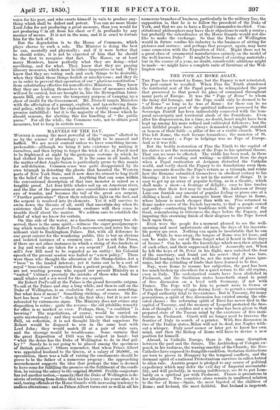MARVELS OF THE DAY.
WONDER is among the most powerful of the " organs " allotted to us by the science of phrenology ; we delight to be amazed and baffled. We are never content unless we have something incom- prehensible—although we bring it into existence by making it ourselves, and then trying to forget the trick of it ; as Fuseli used to be frightened at night by the grotesque costume in which he had clothed his own lay figure. It is the same in all lands, but the matter-of-fact Anglo-Saxon is particularly prone to this mania for self-delusion. Common sense was quite disappointed by its own triumph in detecting the ghosts that haunted the Western parts of New York State, and it now does its utmost to hug itself in the belief of the sea serpent. Anything that can come within the conventional description of that rare monster is seized as a tangible proof. Let four little whales sail up an American river, and the line of the procession at once consolidates under the eager eye of wonder, and becomes the tail of the great sea serpent. " Further particulars" throw their relentless light on the fact, and the serpent is resolved into its elements. Yet it will survive to swim down the throats of all, until that uncertain day when its existence shall be proved—human credence will then cease to trouble itself about the matter. We seldom care to establish the belief of what we know for certain.
On this side of the water, as a facetious contemporary has ob- served, there is the same spirit,—witness the eager gossipmonger- ing which watches Sir Robert Peel's movements and notes his sig- nificant visit to Buckingham Palace. But, with all deference to our great caterer for the wondering public, this is but an obvious and isolated instance of a common case. Let us ask the Times, if there are not other instances in which a string of fire-buckets or a log and weeds are taken for a sea serpent ? Lord John Rus- sell's Jew Bill used to be regarded as an entity: his Colonial speech of the present session was hailed as " a new policy." There were those who thought the alteration of the Stamp-duties Act a " boon " to the landed interest ; yet it turns out to be a sort of royal " benevolence " extracted from a patient people. Nay, there are not wanting persons who regard our present Ministry as a "united" Cabinet: precisely the mistake of those who took four small whales and a sea-weed for the sea serpent.
Sir Robert Peel's call at the Palace is the grand favourite enigma. To call at the Palace and stay a long while, and then to call on the Duke of Wellington, is an evolution that must mean something. But what does it mean ? Something striking, of course. Sir Ro- bert has been " sent for "—that is the first idea ; but it is not cor- roborated by extraneous signs. The Ministry does not evince any disposition to retire : quite the reverse—the old pitchlike tenacity for office is as marked as ever. Perhaps, then, " a coalition " is brewing? The negotiations, of course, would be carried on quite mysteriously ; and they would take some time to elaborate. Still, on reflection, it is not thought likely that sagacious Sir Robert would be disposed to row in the same boat with Lord john ; they would match ill at a pair of state oars, and the steerage would be troublesome. Some surmise that the great Exposition of 1851 was the subject in hand: but "what the deuce has the Duke of Wellington to do in that gal- ley ? " Surely he is not going to be placed among the specimens of British produce ? Others remember, that when Prince Albert was appointed husband to the Queen, at a salary of 30,000/., on speculation, there was a talk of raising the emoluments should he prove to be the father of a numerous progeny : the approaching accouehement suggests the idea that perhaps the time is deemed to have come for ' the promise on the fulfilment of the condi- tion, by raising the salary to the original 50,000/. Prolific conjecture has yet another notion, —namelyithat the Duke of Wellington is de- sirous of retiring from duties that tax his years ; his years also, it is said, faxing officials at the Horse Guards with increasing tendency to endless alterations : and as Prince Albert turns out so well in all his
numerous branches of business, particularly in the military line, the supposition is, that he is to follow the precedent of the Duke of York, and that we are to have a Royal Commander-in-chief. Con- stitutional philosophers may have their objections to such a course ; but probably the subordinates at the Horse Guards would not dis- like to make the exchange. So that the Duke of Wellington would in future confine his industry to the business of sitting for pictures and statues : and perhaps that prospect, again, may have some connexion with the Exposition of 1851. 31 ight there not be a great class of ornamental manufactures entirely on the model of the well-known Duke ? It might be formed of existing materials ; but in the course of a year, no doubt, considerable additions might be made—we might have a complete suite of furniture of the Wel- lington east.


























 Previous page
Previous page